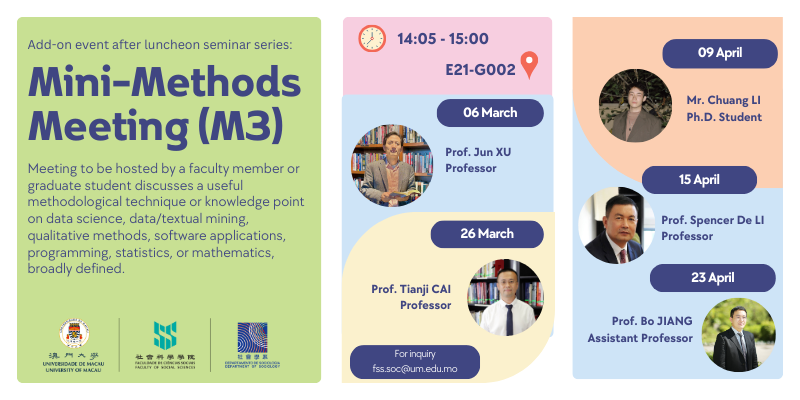

Date: April 9
Time: 1:00 pm – 2:00 pm
Speaker: Prof. Ze Hong
Venue: E21B-G002
Organizer: Department of Sociology
Phone: 8822 4595
I argue that fictionality—understood as a form of “make-believe” that requires the audience to suspend disbelief—has been largely absent throughout most of human history. This is due to two key factors: 1) humans are not psychologically predisposed to recognize fictionality, as it is cognitively demanding, and 2) traditional societies often have worldviews that allow for promiscuous causal possibilities, preventing narratives from being marked as fictional by their implausibility. I review extensive ethnographic and historical evidence suggesting that stories we now consider fictional were largely regarded as factual accounts of the past or attempts at such accounts. Additionally, I offer a critical discussion of how the absence of fictionality in diverse human societies impacts evolutionary theorizing about fictionality, as well as the broader cognitive and social consequences of (the lack of) fictional narratives.
Kevin (Ze) Hong is a behavioral scientist who studies human behavior and culture from evolutionary and cognitive perspectives. He obtained a bachelor’s degree in Biology from Grinnell College, a master’s degree in Evolutionary Biology from the University of Pennsylvania, and a PhD in Human Evolutionary Biology from Harvard University. He worked as an assistant professor in the Department of Sociology at Zhejiang University and is currently an assistant professor in the Department of Sociology at the University of Macau and a research associate in the Department of Human Evolutionary Biology at Harvard University. Research-wise, He uses methodologically diverse approaches (e.g., theoretical modeling, quantitative analysis of historical data, ethnographic fieldwork) to study human behavior and culture from rainmaking to gambling, with special attention paid to information processing at the individual level and information transmission at the population level. His publication appears in diverse journal venues such as Current Anthropology, American Anthropologist, Behavior and Brain Sciences, Human Nature, Human Ecology, Religion, Brain & Behavior, Journal of Theoretical Biology, and Cognitive Science. His current field sites include the Yi in southwest China and the Wa in China-Burma border where he focuses on the psychological and social factors that sustain divination and magic practices.
The Mini-Methods Meeting (M3), held right after the luncheon seminar. Hosted by faculty or graduate students, M3 will feature a 20-30 minute focused discussion on methodological techniques or topics in data science, programming, statistics, and more. The milieu of this series is informal and offers hands-on instruction.
- Date: 09 April 2025 (WED)
- Time: 14:05 – 15:00
- Topic: Misunderstandings of Case Study Research
- Host: Mr. Chuang Li (PhD student)
*This event is open only to Sociology department members and students.

